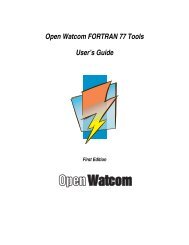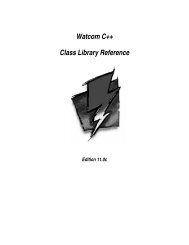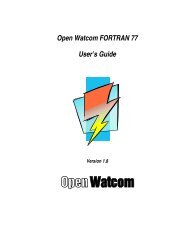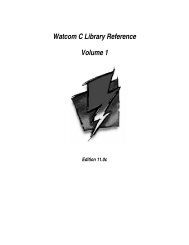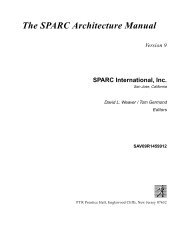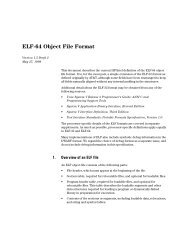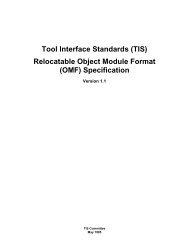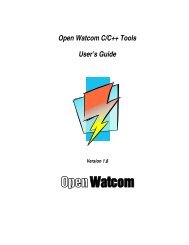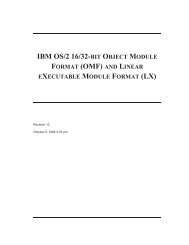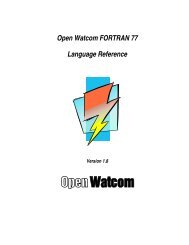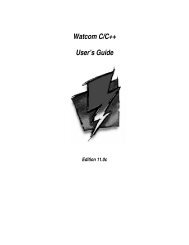Open Watcom Developer's Guide - HEAnet Mirror Service
Open Watcom Developer's Guide - HEAnet Mirror Service
Open Watcom Developer's Guide - HEAnet Mirror Service
Create successful ePaper yourself
Turn your PDF publications into a flip-book with our unique Google optimized e-Paper software.
Building<br />
selective builds and destroys. Some tokens which should be used by the appropriate<br />
makefiles are:<br />
all<br />
build<br />
os_x<br />
cpu_x<br />
target_x<br />
is implicit in every makefile and does not need to be listed explicitly<br />
indicates that wmake should be run in this directory as part of the build process<br />
for each x in the list of the valid host_os tokens (os_nt, os_dos, etc)<br />
for each x in the list of the valid host_cpu tokens (cpu_386, cpu_ppc, etc)<br />
for each x in the list of valid host_cpu tokens (for compilers and targetted apps)<br />
tiny, small, compact, medium, large, huge, flat, nomodel<br />
the memory model<br />
inline, calls whether an app uses inline 8087 stuff or fp calls<br />
For example, an executable which is going to run on the PPC version of NT should have a<br />
pmake line which contains, at a minimum:<br />
#pmake: build os_nt cpu_ppc<br />
Pmake also supports the concept of priority. The priority is specified as /nnn after the #pmake<br />
but before the colon (:) like so:<br />
#pmake/50: build os_nt cpu_ppc<br />
Makefiles with lower priority are visited first. The default priority if not explicitly specified is<br />
100. Pmake will visit subdirectories in depth first traversal order unless changed by the -r<br />
option or the priority value.<br />
You are free to add as many mnemonic identifiers as you want, of course, but anything which<br />
you feel is an abstract classification that would apply to other projects, please bring to our<br />
collective attention and if deemed useful, it will get added to the appropriate places (and the<br />
list above).<br />
For an example of where this is useful, if we suddenly found out that our NT headers were<br />
bogus and everything including them needed a recompile, we could do the following on the<br />
build machine: "pmake os_nt -h clean & pmake os_nt -h".<br />
Another very useful property of this setup is that it allows people to build libraries/binaries<br />
only for their host platform. This is especially convenient if they don’t have all the necessary<br />
SDKs, Toolkits and whatnot installed and/or cannot run some or all of the platform specific<br />
20 Pmake Support




